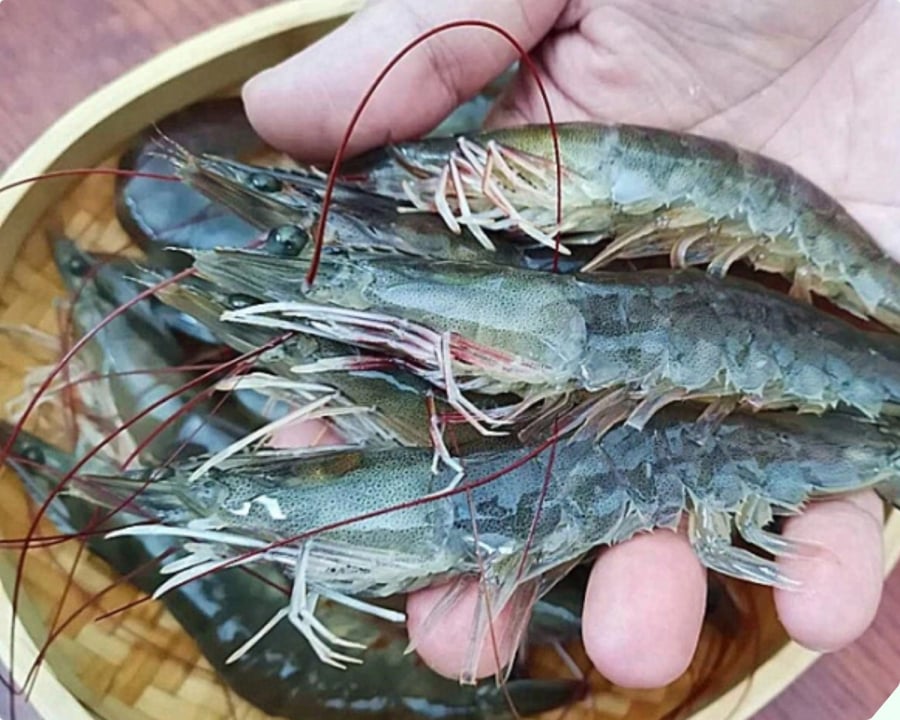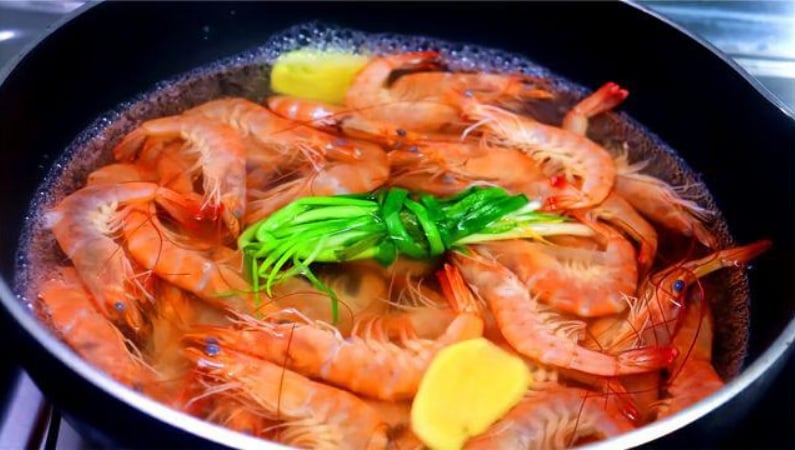Shrimp is a popular seafood choice due to its delicious flavor and high nutritional value. However, achieving that perfect boil with an appealing taste and no fishy smell can be a challenge.

Select Fresh Shrimp
Why Do Shrimp Often Have a Fishy Odor?
The fishy smell in shrimp comes from organic compounds and bacteria present in their flesh, especially in the head and shell areas. Improper cooking methods can intensify this odor, diminishing the appeal of the dish and leaving diners uncomfortable.
Boiling Shrimp with Turmeric Leaves: The Secret to Success
Ingredients
- Fresh shrimp (about 500g)
- Water (enough to submerge the shrimp)
- A handful of fresh turmeric leaves
- Salt (1 teaspoon)
- 1 slice of ginger (optional)
Instructions
-
Shrimp Preparation: Rinse the shrimp thoroughly under running water to remove any dirt or debris. For best results, remove the shrimp’s whiskers and eyes to reduce the fishy odor.

Boiled shrimp with turmeric leaves turns a captivating red and tastes delicious
-
Prepare the Boiling Water: Fill a pot with water, add a teaspoon of salt and a slice of ginger (if desired). Ginger not only helps eliminate odors but also enhances the shrimp’s flavor.
-
Add Turmeric Leaves: Before adding the shrimp, rinse a handful of fresh turmeric leaves and place them in the pot of water. Turmeric leaves are highly effective at neutralizing fishy odors and preserving the shrimp’s attractive color.
-
Boil the Shrimp: Once the water reaches a rolling boil, carefully add the shrimp. Continue boiling for approximately 3-5 minutes, or until the shrimp turn a vibrant red. Be careful not to overcook, as this can make the shrimp rubbery and deplete its nutritional value.
-
Plunge the Shrimp into Cold Water: As soon as the shrimp are done boiling, remove them from the pot and immediately place them in a bowl of cold water to stop the cooking process. This step ensures the shrimp remain crisp and prevents blackening of the heads.
-
Presentation: Once the shrimp have cooled, drain the water and arrange them on a serving plate. The shrimp will exhibit a stunning red color, free from any fishy odor, and the natural sweetness of the seafood will be enhanced.
The Benefits of Turmeric Leaves
- Odor Removal: Turmeric leaves contain natural compounds that eliminate fishy odors, enhancing the freshness of the shrimp.
- Aesthetic Appeal: Using turmeric leaves prevents blackening of the shrimp heads and maintains their attractive color.
- Nutritional Boost: Turmeric leaves are rich in antioxidants and minerals, offering additional health benefits.
With this simple trick, you can easily prepare boiled shrimp that are not only delicious but also free from any fishy odor and visually appealing. Try this boiling method with fresh turmeric leaves to create wonderful meals for your family and friends! Good luck, and happy cooking!
Dipping Sauce Recipes to Accompany Boiled Shrimp

Lemongrass and Calamansi Dipping Sauce
Calamansi juice: 8 teaspoons
Sugar: 10 teaspoons
Salt: 2 teaspoons
Green and red chili peppers (adjust to taste)
Sliced lemongrass stalks
Salt, Pepper, and Lemon Dip
Salt: 2 teaspoons
Lemon juice: 1 teaspoon
Sugar: 1/2 teaspoon
Enjoy your delicious meal!
The Perfect Dipping Sauce: A Tasty Blend with Floating Chilli and Garlic Goodness
Here’s a mouth-watering twist on a classic Vietnamese dipping sauce – a spicy garlic chili sauce that will tantalize your taste buds and elevate any dish. This sauce is the perfect balance of spicy and tangy, with a kick of garlic that will keep you coming back for more. It’s incredibly versatile and can be paired with a variety of dishes, taking your dining experience to the next level.
The Ultimate Guide to Fish: A Simple Trick to Remove that Fishy Odor, Leaving a Delicious and Tender Dish You’ll Always Remember
With this fish stew recipe, you’ll create a mouth-watering, flavorful dish that will leave a lasting impression. The tender, flaky fish infused with a harmonious blend of spices and herbs will tantalize your taste buds and keep you craving more. This dish is a true culinary masterpiece, a testament to your culinary prowess that will have your guests begging for the recipe.





































